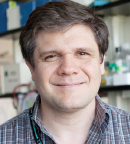Uveal melanoma is the second most common type of skin cancer. Approximately 50% of patients with uveal melanoma will develop metastasis, most commonly to the liver. The disease can appear more than 10 years after the primary lesion has been removed, lying dormant for long periods. There are currently no U.S. Food and Drug Administration–approved therapies for metastatic uveal melanoma, and patient survival is poor, with almost half of patients succumbing to the disease.

If we are successful, our findings will for the first time shed light onto how uveal melanoma remains dormant for over a decade in many patients and could significantly change treatment protocols.— Julio Aguirre-Ghiso, PhD
Tweet this quote
Research teams from the Icahn School of Medicine at Mount Sinai and Thomas Jefferson University in Philadelphia have received a grant to study the effects of key genetic mutations on the disease, to learn why some cells remain dormant, and to understand the mechanism that causes dormant cells to awake and spread aggressively. The teams also hope their work will lead to new therapies to prevent or greatly delay uveal melanoma metastasis. Julio Aguirre-Ghiso, PhD, Professor of Medicine, Hematology, and Medical Oncology at the Icahn School of Medicine at Mount Sinai, Associate Director for Basic Shared Resources, and Director of Head and Neck Cancer Basic Research at The Tisch Cancer Institute, will lead the Mount Sinai team and is co-recipient of the $485,000 award from the Dr. Ralph and Marian Falk Medical Research Trust, along with Andrew Aplin, PhD, Professor of Cancer Biology at Thomas Jefferson University and principal investigator of the study.
The Thomas Jefferson University research and clinical team’s expertise in oncogene biology and cancer cell dormancy and their access to large numbers of uveal melanoma patients are complemented by Mount Sinai’s expertise in cell biology and tumor metastasis. Together, their long-term objective is to inform effective treatment options for advanced-stage uveal melanoma.

Andrew Aplin, PhD
Clinically Unmet Need
“If we are successful, our findings will for the first time shed light into how uveal melanoma remains dormant for over a decade in many patients and could significantly change treatment protocols,” said Dr. Aguirre-Ghiso. “More importantly, such knowledge might help in the future save lives affected by uveal melanoma, a poorly understood cancer.”
“We are tackling a clinically unmet need in the melanoma field via an inter-National Cancer Institute–designated Cancer Center collaboration,” said Dr. Aplin. ■

